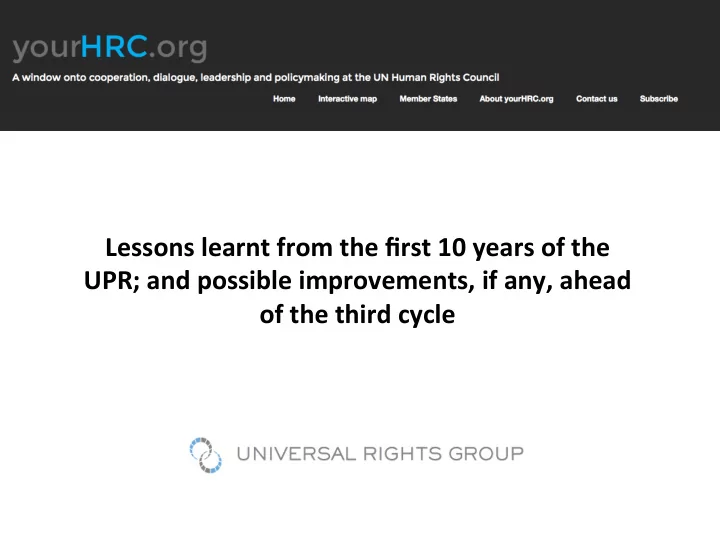

Lessons ¡learnt ¡from ¡the ¡first ¡10 ¡years ¡of ¡the ¡ UPR; ¡and ¡possible ¡improvements, ¡if ¡any, ¡ahead ¡ of ¡the ¡third ¡cycle ¡ ¡ ¡
UPR ¡ ¡ - First 10 years of the UPR First ¡10 ¡years ¡ Seen by nearly everyone as a HRC ‘success story’ Universal participation; high levels of political engagement; mechanism based on cooperation and dialogue; some evidence that has led to real world changes/improvements Yet compliments should not give way to complacency New URG policy report, based on analysis of first 2 cycles, UPR reports of 74 States, over 5,000 recommendations and their follow-up, over 60 interviews and 3 policy dialogues: some signs that ‘honeymoon period’ may be coming to an end Some important structural weaknesses Should these be addressed or not ahead of UPR3? ‘Twist or stick’?
UPR ¡ ¡ - First 10 years of the UPR First ¡10 ¡years ¡ If some modifications, which ones require Bureau interventions, and which can be done through improved practice (incl. stronger adherence to IBP/5 year review, and stronger focus on implementation/ follow-up)? URG’s analysis shows a few key areas where States should proactively consider current situation and what improvements, if any, might be brought
Possible ¡structural ¡weaknesses ¡ ¡ and ¡proposed ¡responses ¡
Inputs ¡into ¡the ¡ UPR ¡ - Second and subsequent cycle reports should focus, in particular, on implementation ¡ The ¡3 ¡reports ¡ URG’s analysis shows that State reports are doing so (by and large) But are they ‘objective’ and ‘reliable’ – as per IBP? Are they based on inclusive national consultations? 2 compilation reports are not, by and large, focusing on implementation = taken all together, represents significant challenge to UPR’s credibility Possible responses • Improved national consultation and reporting guidelines? • OHCHR, GANHRI support to domestic NGOs – improved guidance, workshops, attach previous recommendations to calls for input? • OHCHR – explicitly link TB and SP reporting to UPR recomms. Plus OHCHR own analysis. And consolidated UNRC inputs? • Word limit for compilation reports? 10,000, or 8,500 (UN standard)
Peer ¡review ¡ ¡ - Utility of WG sessions UPR ¡Working ¡Group ¡ Different views on whether political participation going down. In terms of SUR delegations, URG found level has gone up But wide agreement that sessions increasingly formulaic or ‘ritualistic’ Should be place for frank exchange, interactive dialogue/debate, constructive criticism, question and answer, peer-to-peer advice Possible responses • Greater use of advance questions • Develop ‘List of Issues Prior to Reporting’ (LOIPR) – possible under IBP (troika should ‘collate issues’) and PRST 8/1. 10 days. More focused presentation & ID– esp. recommendation implementation • Maybe not possible now, but one day will have to grapple again with question of NHRI and NGO response in WG (not recommendations) • In meantime, troika could present summary of 2 compilation reports • All reviewing States should systematically follow-up on earlier recs.
Recommenda@ons ¡ ¡ - UPR recommendations UPR ¡Working ¡Group ¡ Big jump in number (27 per SUR at 1 st session, to over 200 at 17 th ) But URG analysis = mainly due to incr. in reviewing States Yet still problematic, esp. for small delegations Quality: URG analysis suggests that around 85% of recomms. ‘normal’ – i.e. align with principles of UPR (IBP) But number of ‘unspecific’ recs. increases for some regions, especially within regional groups Possible responses • All States should ensure their recommendations are ‘useful’ to SUR and ‘measurable’ for UPR WG follow-up Return to very clear binary options: accept or take note •
Recommenda@ons ¡ ¡ - Quan;ta;ve ¡evolu;on ¡
Recommenda@ons ¡ ¡ - Friend-‑to-‑friend ¡ ¡ recommenda;ons? ¡ ¡
Adop@on ¡in ¡ ¡ plenary ¡ - Adoption in HRC plenary ¡ Does this add anything? HRC ¡plenary ¡ ¡ NGOs and NHRIs commenting on something already cooked? Possible responses • Bureau – amend HRC POW to convene special UPR plenaries at end of UPR WGs • Would moving item 6 to last week of HRC regular sessions help? • Plenary adoptions should be transformed to space wherein SURs clarify position of recommendations, describe implementation plans and strategies, and (where approp. request international support), and wherein parliaments, NHRIs and NGOs can discuss their roles To better prevent reprisals – UPR Reprisal Protocol? •
Implementa@on ¡ ¡ - On-the-ground implementation and impact On-‑the-‑ground ¡ ¡ Implementation and impact determine ultimate value of UPR Is heavily State-to-State, peer review character of UPR creating skewed picture of implementation (national reports = 48% implemented, 20% partially implemented.) Some SUR = 82%! 1 very positive consequence of UPR = development of SNICRS Possible responses • Need greater focus on SNICRS – sharing good practice, support, use of indicators, link in with UNCTs, Universal Index, SDGs, etc. • Space on Council’s agenda (inter-sessional?) for exchanging experiences and good practice on implementation? • NGO – vital role to push for implementation, and as independent or ‘dissenting’ voice on implementation/impact • Key role of NHRIs – coordinate, build capacity of local NGOs • Parliamentary involvement (oversight) – IPU guidelines? Input into ‘Other stakeholder’ reports? UNRCs – systematically integrate accepted UPR recs into UNDAFs •
Implementa@on ¡ ¡ Mirror ¡mirror… ¡
Recommend
More recommend